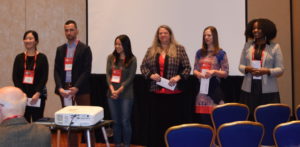Article begins
Each year, the Council on Anthropology and Education (CAE), a section of the American Anthropological Association (AAA), supports early career educational anthropologists through the Concha Delgado-Gaitán Presidential Fellows Program. Concha Delgado Gaitán is an educational anthropologist whose contributions to the field of Anthropology and Education have been recognized and have earned her many awards, including the George and Louise Spindler Award. In the words of former CAE President, Marta Baltodano, “This fellowship is designed to give early-career scholars a mentoring boost toward tenure and/or professional success, and to cultivate the next generation of CAE leadership.”
To qualify for the Concha Delgado Gaitán CAE Presidential Fellowship, applicants must have earned their doctorate by August 15 of the award year and no earlier than three years prior. International applicants are welcome, and applications from underrepresented groups and institutions are especially welcome. Recipients are provided grant monies to attend the Annual Meeting of the American Anthropological Association, and they are paired with senior mentors who provide one-on-one career advice and support. Fellows also participate in a professional learning community with their cohort, previous presidential fellows and mentors, as well as Concha Delgado-Gaitán, who serves as a mentor-at-large.
As part of the CAE’s spotlight on 2017 Presidential Fellows, current award recipients were invited to share what drew them to anthropology and how they are applying anthropological theory and methods to the study of educational problems. Here is what some of them had to say:
MinSoo Kim-Bossard (The College of New Jersey): As a Korean native living in the United States, I have navigated cultural boundaries on both personal and professional levels. Being perplexed by the ways I was perceived at “home” and abroad, I spent many years grappling with a sense of belonging. Many children from immigrant families navigate a similar in-between space daily, going between home and school. As a teacher educator, I use anthropological tools to make visible the values and practices often taken for granted, particularly when it comes to working with young children. Contesting a singular narrative of “best practice,” I ground myself in anthropology to negotiate emic and etic perspectives of early childhood education. Mentor: Kathryn Anderson-Levitt (UCLA)
Carla A. McNelly (Georgia State University): My MA advisor at the University of Oregon, Rob Proudfoot, suggested I read the work of one of his colleagues, Harry Wolcott. His work drew me toward the methods of seeing and presenting research in education. During my doctoral program in education studies, I became dedicated to qualitative methods of data collection and representation. Whereas, funding sources in education support large data-set research, anthropological method and theory yield experiences of youth, families, teachers, administrators, and communities. As activist scholars, it is our responsibility to share the stories from multiple communities which transcend numbers and statistics about our daily lives. Mentor: Norma González (University of Arizona)

2017 CAE Presidential Fellows MinSoo Kim-Bossard, Paul Hartman, Sylvia Mac, Carla McNelly, Jen Stacy, and Krystal Strong. Not pictured Christian Zúñiga and Thierry Elin-Saintine. Albert Prieto
Thierry Elin-Saintine (Stockton University): My path to academia is often characterized as unusual, and perhaps an illustration of Robert Frost’s (1920) “The Road Not Taken.” I hold graduate degrees in urban education, mathematics, and creative writing. Prior to graduate school, I was actively pursuing a career in theater arts and film. Having journeyed on the “road less traveled” to the field of mathematics, I contend that anthropology (or ethnography) of education allows the space for new conceptions of what/who is a math person, and what constitutes “legitimate” scholarly inquiry. Being a black man working in a field that disproportionally focuses on African Americans’ failures in mathematics, I am indebted to scholars in anthropology/education whose work have underscored the salience of belonging in educational research, and the necessity for more studies on students’ academic identity construction. Mentor: Rodney Hopson (George Mason University)
Christian E. Zúñiga (University of Texas-Rio Grande Valley): Anthropology has been pivotal to my research examining bilingual education language policy impacting minoritized US bilingual communities. Linguistic anthropologists have influenced how I understand and study the relationship between language, identity, and culture. Dell Hyme’s SPEAKING heuristic has supported my appreciation of bilanguaging processes, like translanguaging, as valuable pedagogy. Likewise, Fredrick Erickson’s language ecology perspectives and discourse analysis methodologies have been useful tools to examine dynamic, bilingual classroom interactions from macro and micro level perspectives. Studying the intersections of language, identity, and culture have guided my advocacy for the language rights of US bilingual communities. Mentor: Marjorie Faulstich Orellana (UCLA)
The relationships the Presidential Fellows establish with their mentors and each other strengthen our community. Their ideas bring fresh perspectives and broaden how the CAE views its contributions and impact in various educational contexts. The application deadline for this year’s fellowship is July 15, 2018. To apply, the following materials should be submitted in a single e-mail to Thea Renda Abu El-Haj, Past President of CAE, at [email protected]:
- Updated curriculum vita.
- A statement of no more than two single-spaced pages, specifying scholarly and professional accomplishments, goals within the field of anthropology and education, previous involvement with CAE or AAA (if any), and areas in which mentoring will be beneficial to the applicant.
- One letter of reference and the names of two additional referees.
Please stay connected with CAE and our ongoing efforts by visiting our website, joining our listserv, and following us on Facebook and Twitter: @CouncilAnthroEd
Patricia D. López is an assistant professor of curriculum and instruction at California State University, Fresno and CAE board member. @xicanasoul
Cathy Amanti is clinical assistant professor in the department of early childhood and elementary education at Georgia State University and is a CAE board member.
Patricia D. López [email protected] and Cathy Amanti [email protected] are CAE contributing editors.
Cite as: López, Patricia D., and Cathy Amanti. 2018. “Concha Delgado-Gaitán Presidential Fellows Put CAE’s Mission into Practice.” Anthropology News website, June 29, 2018. DOI: 10.1111/AN.1088

